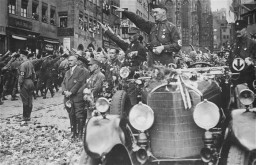<< Previous | Displaying results 6601-6649 of 6720 for "" | Next >>
-
Reoccupation of Vilna
FilmIn June 1944, the Soviet Union launched a massive offensive against the German army in eastern Europe. Soviet forces reoccupied Vilna in July 1944, after bitter street fighting with the German garrison. They then continued on toward Kovno, the capital of Lithuania. This Soviet footage depicts the battle for Vilna and the final reoccupation of the city by the Soviet army.
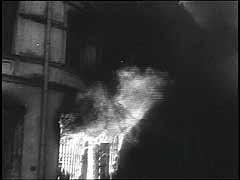
-
The Krakow (Cracow) Ghetto during the Holocaust
ArticleThe Krakow ghetto in German-occupied Poland held over 15,000 Jews. Learn more about Krakow and the ghetto’s history during the Holocaust and WWII.
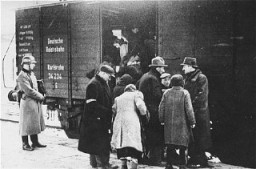
-
Prewar portrait of Golda Tenin with her daughter Paulina
PhotoPrewar portrait of Golda Tenin with her daughter Paulina, 1935. The Tenin family was living in the Ukrainian city of Odesa when it was occupied by Romania, an ally of Nazi Germany. In December 1941, Romanian authorities decided to make Odesa free of Jews. Two of Golda's children, Paulina and Rita, were murdered. Paulina was killed in January 1942, likely during deportation. Rita was killed after she was discovered in hiding with non-Jewish neighbors. Golda managed to survive.
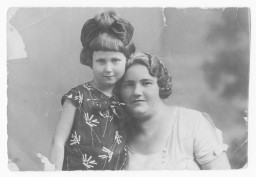
-
The Holocaust in Odesa
ArticleIn October 1941, Romania, an ally of Nazi Germany, perpetrated mass killings of Jews in Odesa. Learn more about the Holocaust in Odesa and Ukraine.
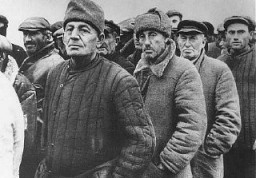
-
Quakers
ArticleThe American Friends Service Committee, a Quaker relief organization, helped thousands of people before, during, and after World War II. Learn about its refugee aid work.
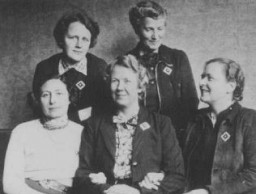
-
Holocaust Survivors and the Establishment of the State of Israel (May 14, 1948)
ArticleLearn more about the establishment of the state of Israel after World War II and its significance to Holocaust survivors.
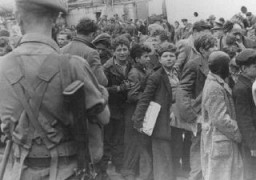
-
Refugees
ArticleThe search for refuge frames both the years before the Holocaust and its aftermath. Learn about obstacles refugees faced when searching for safe havens.
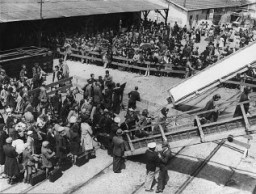
-
At the Killing Centers
ArticleThe Nazis established killing centers in German-occupied Europe to mass murder Jews. Learn more about what happened to Jewish people at these killing centers.
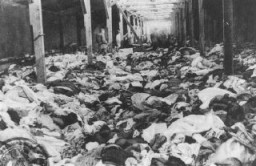
-
The "Jewish Question"
ArticleLearn more about Nazi Germany’s response to the “Jewish question,” an antisemitic idea that the Jewish minority was a problem that needed a solution.
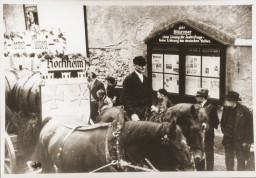
-
Franklin Delano Roosevelt
ArticleFranklin D. Roosevelt was 32nd president of the US. Learn about the domestic and international challenges FDR faced as president during World War II.
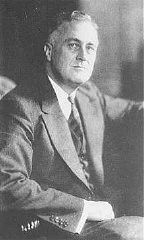
-
Lajos Nagy
ID CardThe Nagys were one of several Jewish families in Zagyvapalfalva, a town 45 miles from Budapest. They owned a general store that served the many coal miners in the mountain valley town. As a young man, Lajos served with the Hungarian army in World War I. He then studied in Budapest to be a diplomat, but a 1920 law restricting the number of Jews in certain professions kept him from pursuing his career. 1933-39: Lajos's father passed away. Lajos took over the general store in Zagyvapalfalva with his bride,…
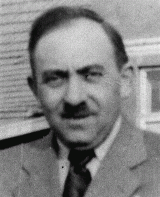
-
Pogroms
ArticleThe term “pogrom” historically refers to violent attacks on Jews by local non-Jewish populations. Learn about pogroms before, during, and after the Holocaust.
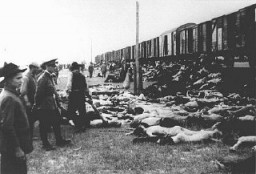
-
Kristallnacht
ArticleOn November 9–10, 1938, the Nazi regime coordinated a wave of antisemitic violence. This became known as Kristallnacht or the "Night of Broken Glass." Learn more
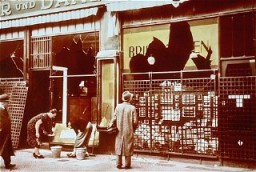
-
Chamberlain, Hitler, and Daladier meet in Munich
PhotoBritish prime minister Neville Chamberlain (left), German chancellor Adolf Hitler (center), and French premier Edouard Daladier (right) meet in Munich to determine the fate of Czechoslovakia. Germany, September 30, 1938.
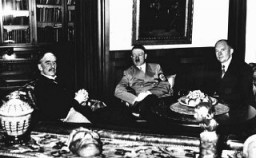
-
A German teacher singles out a child with "Aryan" features
PhotoA German teacher singles out a child with "Aryan" features for special praise in class. The use of such examples taught schoolchildren to judge each other from a racial perspective. Germany, wartime.
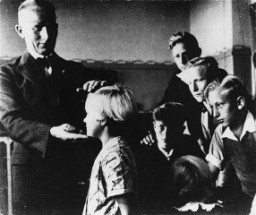
-
Warsaw
ArticleIn October 1940, Nazi authorities established the Warsaw ghetto. Learn more about life in the ghetto, deportations, armed resistance, and liberation.
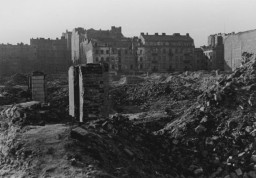
-
Invasion of Poland, Fall 1939
ArticleThe German invasion of Poland in the fall of 1939 triggered WWII. Learn more about key dates and events, causes, and related Holocaust history.
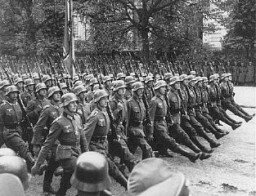
-
The Holocaust and World War II in Ukraine
ProjectExplore the history of Jews in Ukraine before, during, and after the Holocaust through articles, personal stories, historical photographs, artifacts, maps, and more.
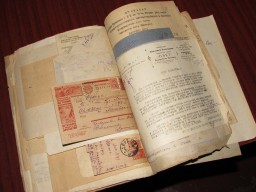
-
Bosnia
ArticleIn July 1995, Bosnian Serb forces killed as many as 8,000 Bosniaks from Srebrenica. It was the largest massacre in Europe since the Holocaust.
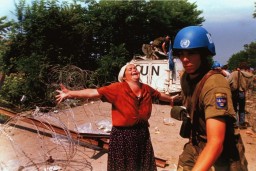
-
Rescue and Resistance
ArticleWhile some European Jews survived the Holocaust by hiding or escaping, others were rescued by non-Jews. Learn more about these acts of resistance.
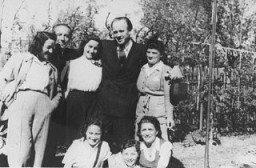
-
Nazi Medical Experiments
ArticleGerman physicians conducted inhumane experiments on prisoners in the camps during the Holocaust. Learn more about Nazi medical experiments during WW2.
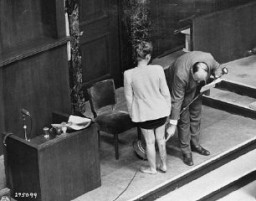
-
Martin Niemöller: Biography
ArticleProtestant pastor Martin Niemöller emerged as an opponent of Adolf Hitler and was imprisoned in camps for 7 years. Learn about the complexities surrounding his beliefs.
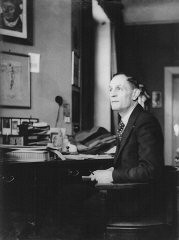
-
Axis Powers and the Holocaust
ArticleEach of Germany’s six European Axis allies participated in the “Final Solution” by murdering Jews or by transferring them to German custody. Learn more.
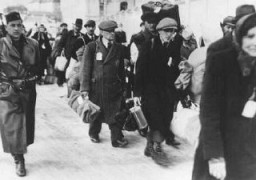
-
Life in Shadows: Hidden Children and the Holocaust
ArticleWhen World War II ended in 1945, six million European Jews were dead, killed in the Holocaust. About 1.5 million of the victims were children.
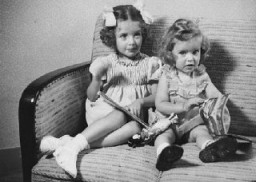
-
Holocaust Deniers and Public Misinformation
ArticleLearn more about Holocaust deniers, public misinformation, and antisemitism.
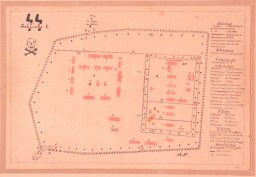
-
Geography of the Holocaust
Media EssayThe Holocaust (1933–1945) was the systematic, state-sponsored persecution and murder of six million European Jews by the Nazi German regime and its allies and collaborators. The Holocaust era began in January 1933 when Adolf Hitler and the Nazi Party came to power in Germany. It ended in May 1945, when the Allied Powers defeated Nazi Germany in World War II. The Holocaust was a German initiative that took place throughout German- and Axis-controlled Europe. It affected nearly all of Europe’s Jewish…
-
D-Day
ArticleThe D-Day invasion was the largest amphibious attack in history. Read articles and browse photos and videos of Allied forces invading Normandy on June 6, 1944.
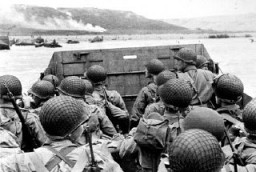
-
General Dwight D. Eisenhower with paratroopers of the 101st Airborne Division
PhotoGeneral Dwight D. Eisenhower visits with paratroopers of the 101st Airborne Division just hours before their jump into German-occupied France (D-Day). June 5, 1944.
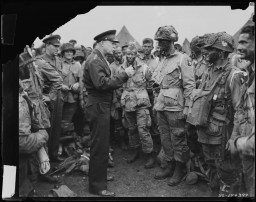
-
Zimbabwe: Overview
ArticleZimbabwe has experienced multiple episodes of mass atrocities since 1980. One of the most severe was the Gukurahundi massacres (1983-1987). Learn more.
-
Adolf Hitler greets Reich Bishop Ludwig Mueller
PhotoAdolf Hitler greets Reich Bishop Ludwig Mueller at a Nazi Party Congress. Roman Catholic Abbot Alban Schachleiter stands between Hitler and Mueller. Nuremberg, Germany, September 1934.
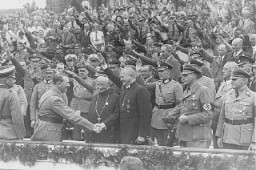
-
Jewish women and girls wearing the compulsory badge
PhotoJewish women and girls wearing the compulsory badge. Vienna, Austria, 1941.
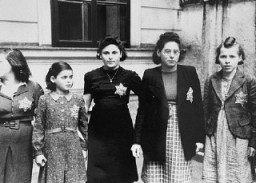
-
Sigmund and Anna Freud in Paris
PhotoSigmund Freud and daughter Anna in Paris, en route to exile in England. June 1938.
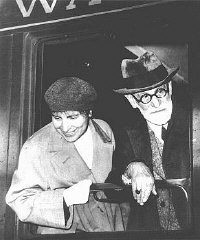
-
Survivors of a death march
PhotoTwo emaciated female Jewish survivors of a death march lie in an American military field hospital in Volary, Czechoslovakia. Pictured on the left is seventeen-year-old Nadzi Rypsztajn.The original caption reads "This girl, only seventeen years old, was forced to march 18 miles a day for 30 days on one bowl of soup a day. The 5th Infantry Division of the U.S. Third Army found 150 in the same condition when they entered Volary, Czechoslovakia."
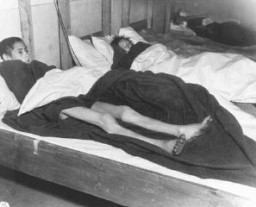
-
Preparing to bury the victims of a death march
PhotoA Hungarian Jewish youth identifies the body of his father, who was shot by the SS during a death march from Flossenbürg. Members of the US military prepare the victims' burial. Neunburg, Germany, April 25, 1945.
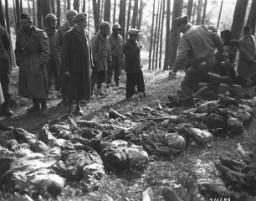
-
Hitler Youth members at a Nazi rally
PhotoHitler Youth members listen to a speech by Adolf Hitler at a Nazi "party day" rally. Nuremberg, Germany, September 11, 1935.
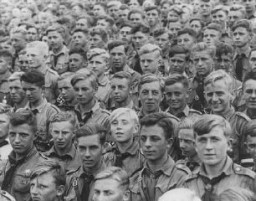
-
A building burns during the suppression of the Warsaw ghetto uprising
PhotoA building burns during the suppression of the Warsaw ghetto uprising. The photograph was taken through the window of a building adjacent to the ghetto. Warsaw, Poland, May 1943.
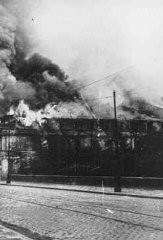
-
St. Louis passengers wait to hear if they can enter Cuba
PhotoPassengers on the St. Louis wait to hear whether the Cuban government will permit them to land. Havana, Cuba, between May 27 and June 2, 1939.
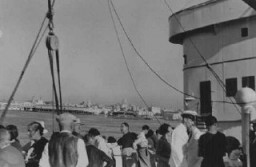
-
A girl in the Kloster Indersdorf children's center
PhotoSofia Karpuk holds a name card intended to help any of her surviving family members locate her at the Kloster Indersdorf displaced persons camp. This photograph was published in newspapers to facilitate reuniting the family. Kloster Indersdorf, Germany, October-November 1945.
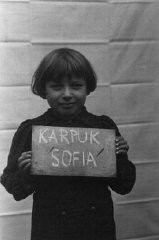
-
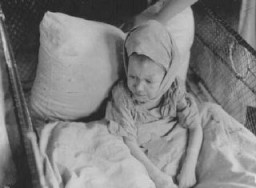
-
A Jewish wedding in Morocco
PhotoJewish wedding in Morocco, 1942. Photo: US Holocaust Memorial Museum, courtesy of YIVO Institute for Jewish Research
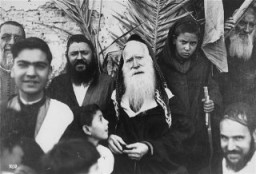
-
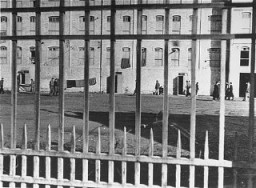
-
Malmedy war crimes trial verdict
PhotoA crowd waits outside the American military court for the announcement of a verdict in the Malmedy war crimes trial of SS soldiers accused of taking part in the massacre of American prisoners of war. Dachau, Germany, July 16, 1946.
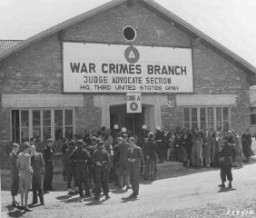
-
Stroop Report cover
ArtifactSS Major General Juergen Stroop, commander of German forces that suppressed the Warsaw ghetto uprising, compiled an album of photographs and other materials. This album, later known as "The Stroop Report," was introduced as evidence at the International Military Tribunal at Nuremberg. Here, its cover is marked with an IMT evidence stamp.
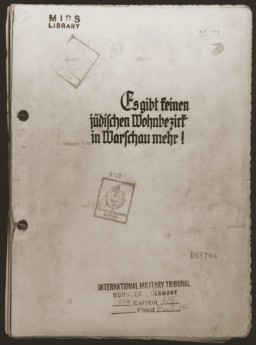
-
Transnistria Governorate
ArticleThe Transnistria Governorate was established in occupied Soviet Ukraine during WWII. Learn more about the Holocaust in Transnistria between 1941-1944.
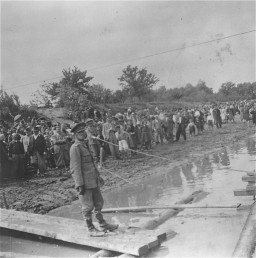
-
Watercolor painting by Simon Jeruchim entitled "Memory of June 6, 1944"
PhotoTeenager Simon Jeruchim learned of the Allied invasion of German-occupied France (D-Day) on a shortwave radio. He painted a watercolor depiction of the bombing and burning of a town situated on a river. He titled the piece "Memory of June 6, 1944." Simon Jeruchim was born in Paris in 1929 to Samuel and Sonia (née Szpiro), Jewish émigrés from Poland. In July 1942, Simon’s parents were able to find hiding places for him and his siblings, but they were arrested and deported to Auschwitz before they…
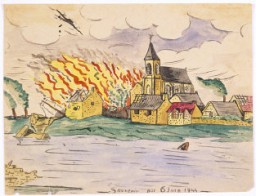
-
US troops pull the survivors ashore on D-Day
PhotoUS troops pull the survivors of a sunken craft onto the shores of the Normandy beaches on D-Day. Normandy, France, June 6, 1944.
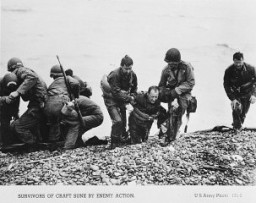
-
St. Louis arrives in Antwerp
PhotoThe St. Louis, carrying Jewish refugees from Nazi Germany, arrives in the port of Antwerp after Cuba and the United States denied it landing. Belgium, June 17, 1939.
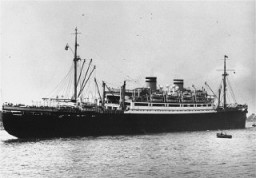
-
World War I: Aftermath
ArticleThe trauma of WWI would profoundly shape the attitudes and actions of leaders and ordinary people during the Holocaust. Learn more about the aftermath of the conflict.
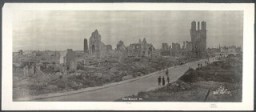
-
The Nazi Rise to Power
ArticleThe Nazi Party was one of a number of right-wing extremist political groups that emerged in Germany following World War I. Learn about the Nazi rise to power.
